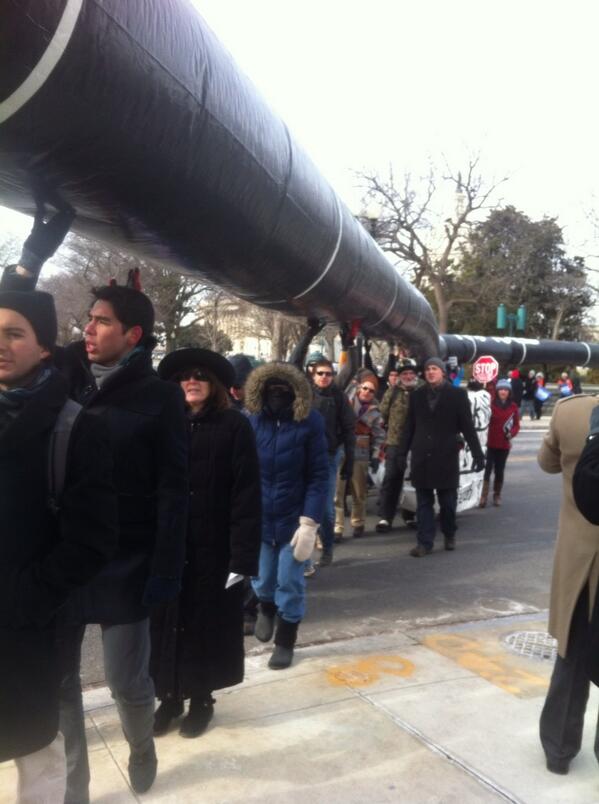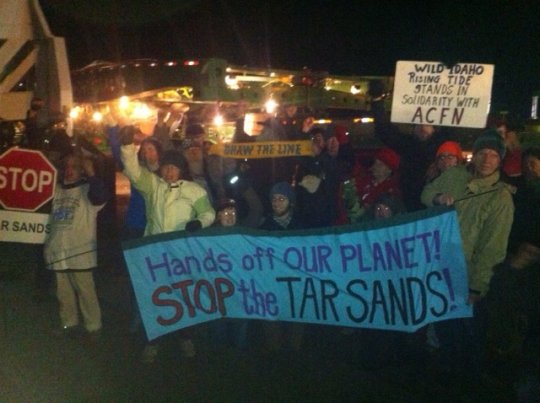Impressive pics and good introduction to the oilsands production process
http://www.businessinsider.com/photos-destructive-canada-oil-sands-2012-10?op=1
Special thanks to Richard Charter
Impressive pics and good introduction to the oilsands production process
http://www.businessinsider.com/photos-destructive-canada-oil-sands-2012-10?op=1
Special thanks to Richard Charter
Published on Tuesday, January 28, 2014
– Lauren McCauley, staff writer
Environmental groups paraded a giant inflatable pipeline around the Capitol building Tuesday ahead of the State of the Union address. (photo: @erichpica/ Twitter)Green groups are calling on President Obama to make a choice: ‘Be remembered as a climate champion or the pipeline president.’
Parading a 100-yard inflatable pipeline outside the U.S. Capitol Tuesday afternoon, demonstrators are hoping to grab the president’s attention ahead of the annual State of the Union address.
Organized by groups including 350.org and Friends of the Earth, the demonstration is calling on Obama to renew the pledge he made last year when he said he would not approve the Keystone XL tar sands pipeline if it is found to “significantly exacerbate” carbon pollution.
“President Obama needs to decide whether he wants to be remembered as a climate champion or the pipeline president. He can’t have it both ways,” said Jason Kowalski, Policy Director for 350.org.
He has “all the information he needs to reject Keystone XL and he should do so in the State of the Union,” the groups added in a statement ahead of the action.

The demonstration comes within days of the anticipated release of the State Department’s Environmental Impact Statement (SEIS) on the project, which Obama previously said he would look to for guidance on whether to permit the pipeline or not.
“Despite shoddy analysis by industry contractors working for the State Department, there is no doubt that approving Keystone XL would have a dramatic impact on the climate and should be rejected immediately by President Obama as not serving the national interest,” the groups continued, referencing a previously released draft of the SEIS which was condemned by both scientists and green groups as “deeply flawed.”
“The State of the Union would be an excellent time to reject the project and embrace a clean energy future,” they add.
Last week, the lesser known southern leg of the Keystone XL began operating, carrying tar sands from its northern terminal in Cushing, Oklahoma to refineries along the Gulf of Mexico.
Whether or not the Keystone XL is approved, the enormous upswell in opposition to the project has “changed American environmental politics,” according to a piece published Friday in the New York Times.
Times reporter Sarah Wheaton writes:
Although some critics say the environmental movement has made a strategic error by focusing so much energy on the pipeline, no one disputes that the issue has helped a new breed of environmental organizations build a mostly young army eager to donate money and time. The seven-year-old email list of 350.org, an organization that focuses on climate change, has more than doubled to 530,000 people since the group began fighting the pipeline in August 2011. In addition, about 76,000 people have signed a “pledge of resistance” sponsored by seven liberal advocacy groups in which they promise to risk arrest in civil disobedience if a State Department analysis, expected this year, points toward approval of the pipeline.
“I remember when I heard the call for civil disobedience, I thought, ‘Yeah, right, you’ll get like 40 people to show up,’ ” Ross Hammond, a senior campaigner with Friends of the Earth, told the Times. “‘And then, bam!’ Over a two-week period, about 1,200 people were arrested at the White House.”
During Tuesday’s demonstration, 350.org founder Bill McKibben reiterated the power of the KXL opposition:
✔ @billmckibben
Giant pipeline currently circling White House, a reminder before tonite’s SOTU of what’s brought environmentalists into the streets
12:14 PM – 28 Jan 2014
http://www.commondreams.org/headline/2014/01/22-9
Published on Wednesday, January 22, 2014
Sacrificing the health of the people and planet, 590,000 additional barrels of oil will now flow to refineries on the Gulf
– Lauren McCauley, staff writer

Activists in Portland, Maine showing solidarity with communities along the pipeline by locking themselves to TD bank. (Photo: Meaghan LaSala)Tar sands oil began flowing through the the southern leg of the Keystone XL pipeline Wednesday as operations commenced delivering the “the dirtiest fuel on Earth” to refineries on the Gulf of Mexico.
The southern leg—the lesser known half of Transcanada’s pipeline—originates in Cushing, Oklahoma and passes through countless communities in Oklahoma and East Texas before arriving at refineries and shipping ports along the coast.
“We are the story that isn’t often told,” East Texas resident Maya Lemon said in a statement circulated by the group NacSTOP (Nacogdoches County Stop Tar Sands Oil Permanently), “the story where Obama’s decision to delay on KXL north was paired with an endorsement to fast track KXL south.”
While opposition to the project has lacked the national attention given to protests against the northern section, local activists and community members on the front lines of the pipeline have long-fought the project and the eminent domain laws that bullied it through.
“We are dissatisfied with the process that allows this pipeline to begin operation, we are frustrated that landowner rights and issues related to eminent domain have never been fully resolved, and we are concerned that our communiies are not prepared to respond safely from this pipeline,” NacSTOP writes in a letter calling for solidarity action nationwide.
Answering that call, two activists in Portland, Maine were arrested for protesting in solidarity with the communities along the pipeline route Wednesday by locking themselves to the front door of a TD Bank, one of the biggest investors in the pipeline.
The activists, both with the group Maine Trans and/or Women’s Action Team, braved 15 degree weather hoping to draw attention to the 590,000 additional barrels of oil that will now flow to refineries located in largely minority communities in Manchester, Texas.
“Climate change’s origin is deeply rooted in this practice of sacrificing of communities that are deemed dispensable,” Betsy Catlin, one of the protesters locked to TD Bank, told Common Dreams.
“It comes as no surprise that these are mostly low-income, communities of color: majority Latina/o on the East End of Houston and majroity African-American in Port Arthur,” said life-long Houston resident and community activist, María Jiménez, who added that these communities “are living examples of environmental racism.”
According to a recent comparitive health study, children raised amid refineries in Houston’s Manchester neighborhood are already 56% more likely to contract childhood leukemia, says Yudith Nieto, an organizer with Texas Environmental Justice Advocacy Services (TEJAS).
“[R]efining tar sands will only increase that percentage while the refineries keep up their blatant disregard for the lives of those of us forced by circumstance to breathe their dangerous emissions on a daily basis,” she added.
Fully operational, the 486-mile southern pipeline will transport 830,000 barrels of crude per day between vast underground storage tanks in Cushing, Okla., and the Gulf Coast, the Dallas Morning News reports. Other pipelines and rail services feed into it from the north.
National environmental groups responded to the news with despair, both for the communities along the pipeline route as well as for what the moment spells for the priorities of American politicians and their approval of the northern half.
“Expediting KXL south was not the mark of a president who really ‘gets’ climate change,” said leading climate activist and founder of 350.org Bill McKibben, who later tweeted:
“Tar sands is more corrosive, more toxic, and more difficult to clean up than conventional crude. Coupled with lax oversight and TransCanada’s dismal safety record, this pipeline spells bad news for farmers and families whose land, health, and safety were forfeited so that oil companies can reach export markets with their deadly product,” said Sierra Club executive director Michael Brune in a statement.
“We hope from this point on that unity is the clarion call for the climate movement,” lamented Juan Parras, founder of TEJAS.
“Environmental Justice communities, private property owners, residents living in proximity to the pipeline, and all those up and downstream – we’re are all affected here in the same struggle: to permanently stop the most ecologically devastating mining operations in the world and address the ongoing injustices of petrochemical refining,” he added.
Speaking with residents along the pipeline route, Al Jazeera produced this report on the impact of the southern leg
Elana Schor, E&E reporter
Published: Tuesday, December 17, 2013
TransCanada Corp. will begin shipping heavy oil sands crude from Alberta to the Gulf Coast — the goal of its Keystone XL pipeline — on Jan. 22, when the controversial project’s President Obama-blessed southern leg begins operation, the company announced today.
Environmentalists rarely offer loud criticism of the Obama administration’s green light for the 485-mile pipeline that TransCanada last year renamed the Gulf Coast Project, locked as they are in a years-long campaign to secure a presidential veto of the 1,179-mile northern leg of KXL. But as the pipeline giant’s CEO affirmed in a Reuters interview today, higher prices for heavy oil along the Gulf Coast mean many shippers will seek to move Canadian crude from the 2010-launched Keystone 1 pipeline, which runs from Alberta to Cushing, Okla., onto KXL’s southern portion, which runs from Cushing to Port Arthur, Texas.
“This is another important milestone for TransCanada, our shippers and the refiners on the U.S. Gulf Coast who have been waiting for this product to arrive,” TransCanada spokesman Shawn Howard wrote to reporters.
The company had said last week that it would not disclose the in-service date for the Gulf Coast Project until crude shipments already had begun, citing the risk of financial market speculators aiming to profit off anticipated time frames for deliveries (Greenwire, Dec. 9).
Despite the practical blow that the southern leg’s opening represents, conservation and safety advocates remain as committed as ever to unraveling TransCanada’s border-crossing permit application for the northern section of KXL. The State Department remains at work on a final environmental review of the $5.4 billion project, widely expected to see release next year given an ongoing inspector general inquiry into conflict-of-interest allegations against the private contractor helming the process.
The Gulf Coast Project’s ultimate capacity is expected to reach 700,000 barrels per day, though initial flows are likely to fall below 600,000 bpd as TransCanada continues to seek shipper commitments to run heavy crude through the line.
Special thanks to Richard Charter
http://www.commondreams.org/headline/2013/12/17-4
Published on Tuesday, December 17, 2013
‘They want to extract the dirtiest oil in the world and send it overseas at the expense of communities and the climate’
– Andrea Germanos, staff writer

Activists engaging in a blockade of a tar sands “megaload” in Oregon earlier this month. (Photo: Portland Rising Tide) “The face of tar sands resistance in the Northwest” appeared again on Monday when 16 people were arrested in Oregon after blockading a “megaload” of equipment on its way to the Athabasca oil fields in Alberta, Canada.
Organizers with the climate activism group Portland Rising Tide say protesters set up two blockade sites along Highway 26 near the town of John Day, locking themselves to disabled vehicles in front of the 376-foot long, 901,000-lb load carrying a heat exchanger to be used in tar sands extraction.
While the activists succeeded in at least temporarily halting the transport of equipment, Portland Rising Tide says police used “pain compliance to extract” the four protesters who had locked themselves to the two vehicles, and aggressively arrested others “who were actively trying not to obstruct the load or police activity.”
Among the arrested were the group’s photographers and videographers.
“Transporting loads of such sizes presents a huge threat to rural Oregon’s roads, and rivers,” said Nicole Brown, who grew up in Eastern Oregon and was present at the actions last night. “Law enforcement should focus on protecting Oregon’s roads and rivers and people, rather than multinational fossil fuel interests.”
Portland Rising Tide says that a similar megaload toppled last week in Gladstone, Ore., blocking part of I-205 for hours.
“Are they creating jobs in our communities? No, they want to extract the dirtiest oil in the world and send it overseas at the expense of communities and the climate,” Brown stated.
Weather, mountain roads and protests have already slowed down the megaload’s travel. It now heads east into Idaho and then into Montana before reaching the Alberta tar sands.
It is the first of three megaloads scheduled to pass through Oregon.
Monday’s blockade follows a similar action earlier in the month, when Rising Tide activists and Umatilla tribal members blockaded a megaload of tar sands equipment near the Port of Umatilla in Oregon. In August members of the Nez Perce tribe and others halted a similar megaload of equipment making its way along Idaho’s Highway 12 to the Alberta tar sands fields.
Within the last two weeks, Portland Rising Tide has also occupied offices of megaload shipper Omega Morgan as well as the office of a General Electric subsidiary that makes equipment for what the group has called “the most destructive and outmoded, fossil fuel extraction undertaking on Earth: Alberta tar sands mining.”
____________________